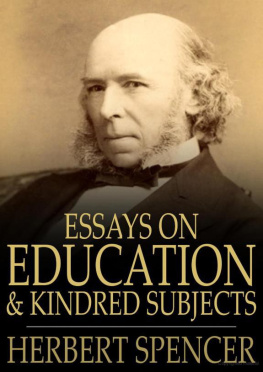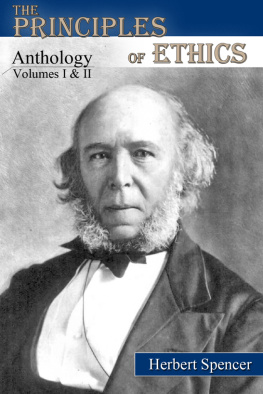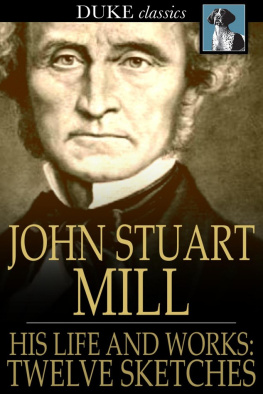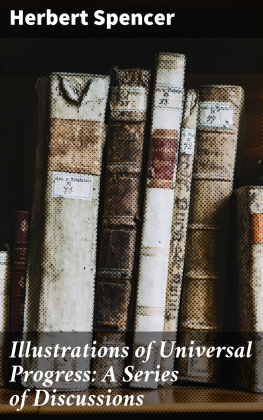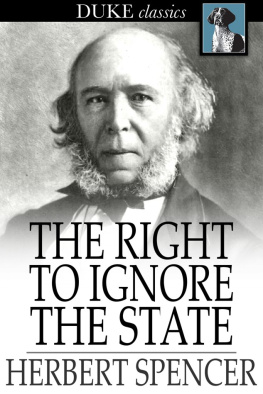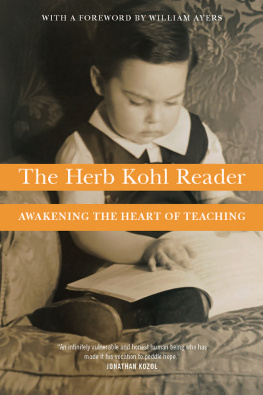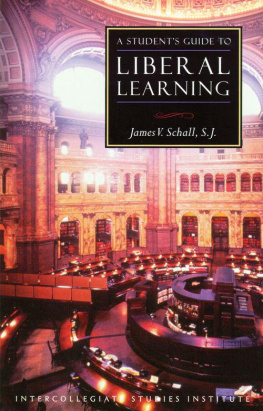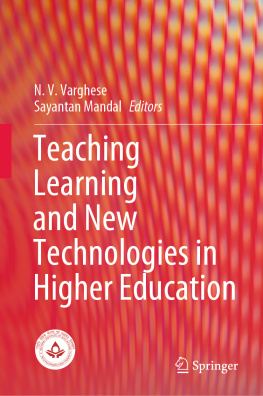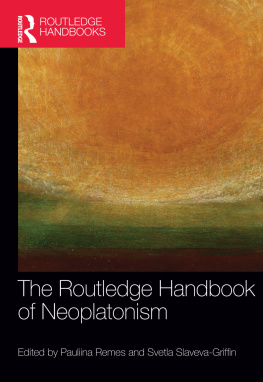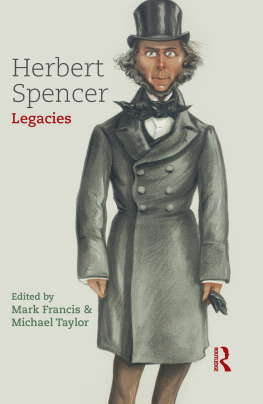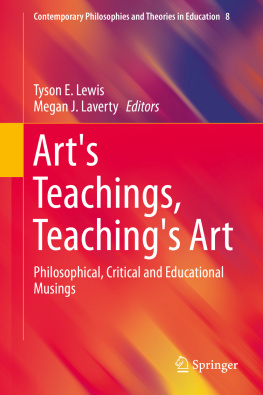Herbert Spencer - Essays on Education and Kindred Subjects
Here you can read online Herbert Spencer - Essays on Education and Kindred Subjects full text of the book (entire story) in english for free. Download pdf and epub, get meaning, cover and reviews about this ebook. year: 1911, publisher: The Floating Press, genre: Science. Description of the work, (preface) as well as reviews are available. Best literature library LitArk.com created for fans of good reading and offers a wide selection of genres:
Romance novel
Science fiction
Adventure
Detective
Science
History
Home and family
Prose
Art
Politics
Computer
Non-fiction
Religion
Business
Children
Humor
Choose a favorite category and find really read worthwhile books. Enjoy immersion in the world of imagination, feel the emotions of the characters or learn something new for yourself, make an fascinating discovery.
- Book:Essays on Education and Kindred Subjects
- Author:
- Publisher:The Floating Press
- Genre:
- Year:1911
- Rating:3 / 5
- Favourites:Add to favourites
- Your mark:
- 60
- 1
- 2
- 3
- 4
- 5
Essays on Education and Kindred Subjects: summary, description and annotation
We offer to read an annotation, description, summary or preface (depends on what the author of the book "Essays on Education and Kindred Subjects" wrote himself). If you haven't found the necessary information about the book — write in the comments, we will try to find it.
Essays on Education and Kindred Subjects — read online for free the complete book (whole text) full work
Below is the text of the book, divided by pages. System saving the place of the last page read, allows you to conveniently read the book "Essays on Education and Kindred Subjects" online for free, without having to search again every time where you left off. Put a bookmark, and you can go to the page where you finished reading at any time.
Font size:
Interval:
Bookmark:
The Project Gutenberg EBook of Essays on Education and Kindred Subjects
by Herbert Spencer
This eBook is for the use of anyone anywhere at no cost and with
almost no restrictions whatsoever. You may copy it, give it away or
re-use it under the terms of the Project Gutenberg License included
with this eBook or online at www.gutenberg.net
Title: Essays on Education and Kindred Subjects
Everyman's Library
Author: Herbert Spencer
Commentator: Charles W. Eliot
Release Date: August 11, 2005 [EBook #16510]
Language: English
*** START OF THIS PROJECT GUTENBERG EBOOK ESSAYS ON EDUCATION ***
Produced by Marilynda Fraser-Cunliffe, Joel Schlosberg and
the Online Distributed Proofreading Team at
http://www.pgdp.net
EVERYMAN, I will go with thee,
and be thy guide,
In thy most need to go by thy side
HERBERT SPENCER Born at Derby in 1820, the son of a teacher, from whom he received most of his education. Obtained employment on the London and Birmingham Railway. After the strike of 1846 he devoted himself to journalism, and in 1848 was sub-editor of The Economist. He died in 1903. |
at the
Aldine Press Letchworth Herts
for
J.M. DENT & SONS LTD
Aldine House Bedford Street London
First published in Everyman's Library 1911
Last reprinted 1963
NO. 504
The four essays on education which Herbert Spencer published in a single volume in 1861 were all written and separately published between 1854 and 1859. Their tone was aggressive and their proposals revolutionary; although all the doctrineswith one important exceptionhad already been vigorously preached by earlier writers on education, as Spencer himself was at pains to point out. The doctrine which was comparatively new ran through all four essays; but was most amply stated in the essay first published in 1859 under the title "What Knowledge is of Most Worth?" In this essay Spencer divided the leading kinds of human activity into those which minister to self-preservation, those which secure the necessaries of life, those whose end is the care of offspring, those which make good citizens, and those which prepare adults to enjoy nature, literature, and the fine arts; and he then maintained that in each of these several classes, knowledge of science was worth more than any other knowledge. He argued that everywhere throughout creation faculties are developed through the performance of the appropriate functions; so that it would be contrary to the whole harmony of nature "if one kind of culture were needed for the gaining of information, and another kind were needed as a mental gymnastic." He then maintained that the sciences are superior in all respects to languages as educational material; they train the memory better, and a superior kind of memory; they cultivate the judgment, and they impart an admirable moral and religious discipline. He concluded that "for discipline, as well as for guidance, science is of chiefest value. In all its effects, learning the meaning of things is better than learning the meaning of words." He answered the question "what knowledge is of most worth?" with the one wordscience.
This doctrine was extremely repulsive to the established profession of education in England, where Latin, Greek, and mathematics had been the staples of education for many generations, and were believed to afford the only suitable preparation for the learned professions, public life, and cultivated society. In proclaiming this doctrine with ample illustration, ingenious argument, and forcible reiteration, Spencer was a true educational pioneer, although some of his scientific contemporaries were really preaching similar doctrines, each in his own field.
The profession of teaching has long been characterised by certain habitual convictions, which Spencer undertook to shake rudely, and even to deride. The first of these convictions is that all education, physical, intellectual, and moral, must be authoritative, and need take no account of the natural wishes, tendencies, and motives of the ignorant and undeveloped child. The second dominating conviction is that to teach means to tell, or show, children what they ought to see, believe, and utter. Expositions by the teacher and books are therefore the true means of education. The third and supreme conviction is that the method of education which produced the teacher himself and the contemporary or earlier scholars, authors, and publicists, must be the righteous and sufficient method. Its fruits demonstrate its soundness, and make it sacred. Herbert Spencer, in the essays included in the present volume, assaulted all three of these firm convictions. Accordingly, the ideas on education which he put forth more than fifty years ago have penetrated educational practice very slowlyparticularly in England; but they are now coming to prevail in most civilised countries, and they will prevail more and more. Through him, the thoughts on education of Comenius, Montaigne, Locke, Milton, Rousseau, Pestalozzi, and other noted writers on this neglected subject are at last winning their way into practice, with the modifications or adaptations which the immense gains of the human race in knowledge and power since the nineteenth century opened have shown to be wise.
For teachers and educational administrators it is interesting to observe the steps by which Spencer's doctrinesand especially his doctrine of the supreme value of sciencehave advanced towards acceptance in practice. In general, the advance has been brought about through the indirect effects of the enormous industrial, social, and political changes of the last fifty years. The first practical step was the introduction of laboratory teaching of one or more of the sciences into the secondary schools and colleges. Chemistry and physics were the commonest subjects selected. These two subjects had been taught from books even earlier; but memorising science out of books is far less useful as training than memorising grammars and vocabularies. The characteristic discipline of science can be imparted only through the laboratory method. The schoolmasters and college faculties who took this step by no means admitted Spencer's contention that science should be the universal staple at all stages of child development. On the contrary, they believed, as most people do to-day, that the mind of the young child cannot grasp the processes and generalisations of science, and that science is no more universally fitted to develop mental power than the classics or mathematics. Indeed, experience during the past fifty years seems to have proved that fewer minds are naturally inclined to scientific study than to linguistic or historical study; so that if some science is to be learnt by everybody, the amount of such study should be limited to acquiring in one or two sciences knowledge of the scientific method in general. So much scientific training is indeed universally desirable; because good training of the senses to observe accurately is universally desirable, and the collecting, comparing, and grouping of many facts teach orderliness in thinking, and lead up to something which Spencer valued highly in education"a rational explanation of phenomena."
Science having obtained a foothold in secondary schools and colleges, an adequate development of science-teaching resulted from the introduction of options or elections for the pupils among numerous different courses, in place of a curriculum prescribed for all. The elaborate teaching of many sciences was thus introduced. The pupil or student saw and recorded for himself; used books only as helps and guides in seeing, recording, and generalising; proceeded from the known to the unknown; and in short, made numerous applications of the doctrines which pervade all Spencer's writings on education. In the United States these methods were introduced earlier and have been carried farther than in England; but within the last few years the changes made in education have been more extensive and rapid in England than in any other country;witness the announcements of the new high schools and the re-organised grammar schools, of such colleges as South Kensington, Armstrong, King's, the University College (London), and Goldsmiths', and of the new municipal universities such as Victoria, Bristol, Sheffield, Birmingham, Liverpool, and Leeds. The new technical schools also illustrate the advent of instruction in applied science as an important element in advanced education. Such institutions as the Seafield Park Engineering College, the City Guilds of London Institute, the City of London College, and the Battersea Polytechnic are instances of the same development. Some endowed institutions for girls illustrate the same tendencies, as, for example, the Bedford College for Women and the Royal Holloway College. All these institutions teach sciences in considerable variety, and in the way that Spencer advocated,not so much because they have distinctly accepted his views, as because modern industrial and social conditions compel the preparation in science of young people destined for various occupations and services indispensable to modern society. The method of the preparation is essentially that which he advocated.
Font size:
Interval:
Bookmark:
Similar books «Essays on Education and Kindred Subjects»
Look at similar books to Essays on Education and Kindred Subjects. We have selected literature similar in name and meaning in the hope of providing readers with more options to find new, interesting, not yet read works.
Discussion, reviews of the book Essays on Education and Kindred Subjects and just readers' own opinions. Leave your comments, write what you think about the work, its meaning or the main characters. Specify what exactly you liked and what you didn't like, and why you think so.

